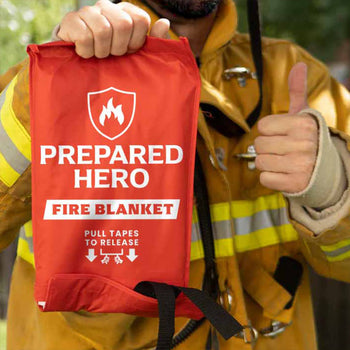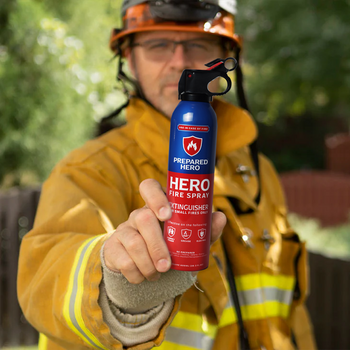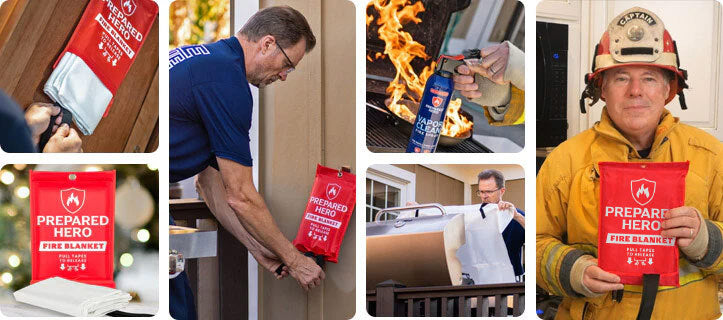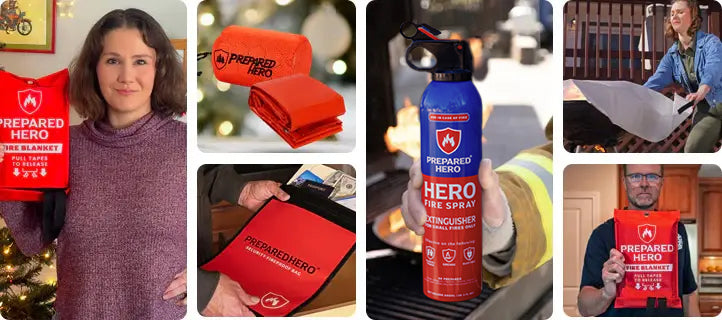Where you put your smoke detectors matters just as much as installing them. Proper placement makes sure they can detect...
Did you know? The risk of death in reported home fires is cut by 60% in homes with working fire alarms compared to those without fire alarms or with malfunctioning ones.
The NFPA (National Fire Protection Association) also states that approximately 59% of deaths were caused by fires in properties without fire alarms (43%) or with fire alarms (16%) that didn’t work.
Given this, smoke detectors are essential in keeping your home safe from deadly fires. But how many smoke detectors do you really need at home? Let’s find out below.
How Do Smoke Detectors Help You Stay Safe?

A smoke alarm detects fire in its early stages, even before flames appear. By alerting you of fire promptly, you have enough time to evacuate your house.
In addition, smoke detectors include sound and visual signals that immediately grab attention. They alert people within the vicinity so everyone can take proper action during fire emergencies.
Aside from saving lives, smoke detectors help protect your property. Early detection and swift response can limit the spread of fire, reduce damage to property, and save valuables.
Many modern smoke detectors are also connected to monitoring stations and emergency services. When a fire occurs, fire alarm systems automatically alert the authorities, which increases the chances of reducing the fire’s devastating effects.
How Many Smoke Detectors Do I Need?

You need one smoke detector inside each bedroom, outside each sleeping area, and on every level of the home, including the basement. Following this, a two-story house with two bedrooms needs at least four smoke detectors.
If your house has a set number of hardwired smoke detectors, you can add battery-operated alarms throughout your home. Remember, there’s no such thing as having too many smoke detectors.
While there are many types of smoke detectors, it’s best to use interconnected smoke alarms because when one alarm goes off, the others will, too. However, having separate smoke alarms is better than having none.
Plus, remember to test your fire alarms every month using the test buttons. Maintain them according to the manufacturer’s instructions, and don’t hesitate to call a professional when you don’t know what to do.
Do You Need a Smoke Detector in Every Room?
Yes, you need a smoke detector in every room. According to the NFPA, you need at least one smoke alarm in every bedroom, outside each sleeping area, and on every level of the home. Following these guidelines increases your chance of surviving a home fire.
Bedrooms are among the most crucial locations for smoke detectors. Many house fires are caused by faulty wiring and other electrical issues, which could start in a bedroom. Plus, people are usually asleep inside, so they need to be warned as soon as possible. Add to that the fact that bedrooms are confined spaces where fire can spread quickly, and you get why experts recommend putting smoke detectors there.
Smoke detectors should also be placed in hallways leading to bedrooms. This warns people before flames or smoke reaches their bedrooms.
How Many Smoke Detectors Do I Need for a Three-Bedroom House?

A three-bedroom house needs at least five smoke detectors: one in each bedroom, one outside the hallway leading to the bedrooms, and one on the main level. More smoke detectors are needed if the house has more than one floor and a basement.
For instance, a three-bedroom house with two floors needs at least six smoke detectors: one in each bedroom (3), one outside the hallway leading to the bedrooms (1), and one on each floor (2). A three-bedroom house with two floors and a basement needs at least seven smoke detectors: one in each bedroom (3), one outside the hallway leading to the bedrooms (1), one on each floor (2), and one in the basement (1).
How Many Smoke Detectors Are in a One-Thousand-Square-Foott House?
The number of smoke detectors needed in a house with 1,000 square feet depends on its layout. You’ll need one smoke detector in each bedroom, one in the hallway outside the bedrooms, and one on each level. For instance, a thousand-square-foot house with two bedrooms and one floor needs at least four smoke detectors: one in each bedroom (2), one in the hallway (1), and one in the main level (1).
More smoke detectors are needed if the house has more bedrooms, a basement, or another floor. However, some sources say that you need at least one smoke detector per 500 square feet. This is not the best way to go because you should go by the layout, not the square footage.
How Many Carbon Monoxide and Smoke Detectors Do I Need?
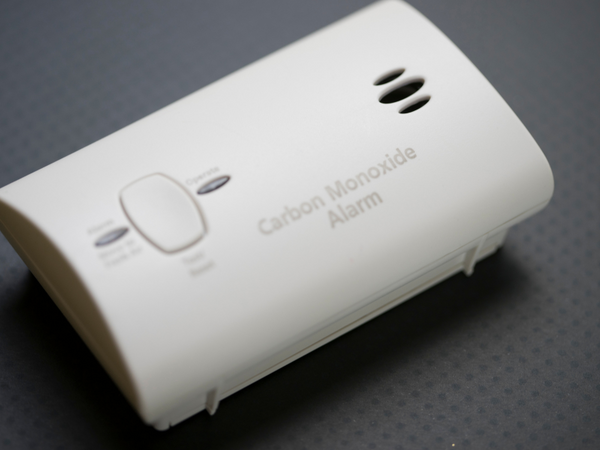
The number of carbon monoxide and smoke detectors you need depends on your house’s layout. Let’s start with one carbon monoxide detector on each floor. Then, add one outside every bedroom. If the bedrooms are on different levels, make sure each floor has one nearby.
You also need carbon monoxide (CO) detectors if you have gas appliances like a stove, water heater, or furnace. Bigger homes or homes with more gas-powered stuff need more CO detectors.
Let’s move to smoke detectors. You need one in every bedroom, one outside each sleeping area, and one on every level of the house, including the basement. So, if you have a two-story home with three bedrooms, you need at least six.
If your home already has a few hardwired ones, you can add battery-operated ones for extra coverage. It’s better to have too many than not enough. Interconnected alarms are your best bet because they all go off together. However, single alarms are better than nothing.
You can also opt for combination smoke and carbon monoxide detectors. One unit contains both detectors, so you don’t have to install them separately. The same principle applies: one in each bedroom, one outside each sleeping area, and one on each floor.
Where Not to Install Smoke Detectors
Avoid installing smoke detectors near stoves, ovens, and toasters. Cooking steam and smoke can set them off for no good reason. The same goes for bathrooms. All that shower steam can trick the sensors and cause false alarms. Don’t mount detectors too close to windows and doors, either. Drafts can push smoke away and trick the detectors.
Ceiling fans and HVAC vents can also mess with airflow and make it harder for detectors to pick up on smoke. Unheated areas like attics? Not ideal. Big swings in temperature and humidity might damage the detector over time.
Avoid installing smoke detectors too close to fluorescent lights as well. Place them at least 12 inches away, just to be safe. Plus, don’t stick detectors in high spots where you can’t reach them for testing, like tall foyers or way above a stairway. Lastly, don't tuck them into ceiling corners because smoke takes longer to reach those areas. In short, keep your smoke detectors on the ceiling, but not in weird spots where air, steam, or heat could mess with them.
Conclusion
Smoke detectors keep you, your loved ones, and your property safe from fire by alerting you early. Pair them with a complete fire kit containing an emergency fire blanket, fire spray, fire protection gloves, and a flame shield for extra protection.
Do you want reliable, easy-to-use, and affordable tools to put out small fires before they spread? Check out Prepared Hero’s fire prevention tools here, and get up to 51% off on certain items. Stay prepared, hero!


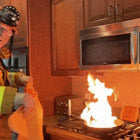 Fire
Fire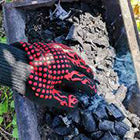 Safety
Safety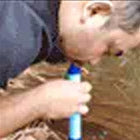 Survival
Survival Protection
Protection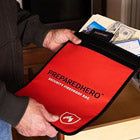 New
New
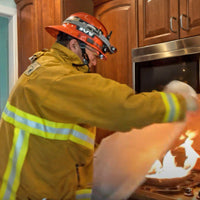 Fire
Fire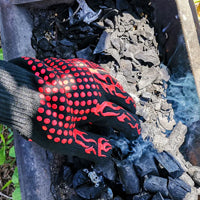 Safety
Safety Survival
Survival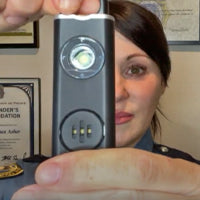 Protection
Protection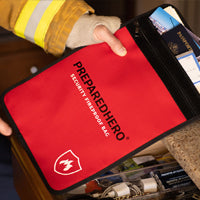 New
New
